Cecil and his companions fly beneath planet’s crust and find an entire underground world. Before they can start their hunt for the Dark Crystals, the Enterprise gets caught in the crossfire between the Red Wings and another army.
Airship Under Attack
Cid, Cecil, and the others react as the Enterprise gets caught in the blasts:
 |  |
| Final Fantasy IV (Super Famicom) | Final Fantasy II (Super NES) |
| Japanese Version (basic translation) | English Version |
| Cecil: Is that…!? | Cecil: What’s that? |
| Cain: The Red Wings! | Kain: The Red Wings! |
| Yang: We were one step too late! | Yang: We are late! |
| Cecil: But who are they fighting…? | Cecil: But who’s fighting? |
| Cid: Urgh! We’re gonna forcibly barge our way through! Hold on tight! | Cid: We’ve got to get out of here! …Hold on! |
| Explosions rock the airship | |
| Cid: Are you in pain, Enterprise?! Just hang in there! | Cid: Hold out! Enterprise! |
| Cecil: We’re going down! | Cecil: We’re going down! |
The scene is handled well in translation, although in the original text we see Cid worrying and caring for the ship as if it were an actual living being.
More interestingly, one of the lines in this scene was altered for the Easy Type release:
 |  |
| Final Fantasy IV (Original) | Final Fantasy IV (Easy Type) |
Here, the Japanese phrase for “barge through forcibly” had a word removed to simplify the text and ensure its intent was clear for younger readers.
The Enterprise makes a crash landing and the screen turns black. The party members call out to each other:
 |  |
| Final Fantasy IV (Super Famicom) | Final Fantasy II (Super NES) |
| Japanese Version (basic translation) | English Version |
| Rosa: Cecil! | Rosa: Cecil! |
| Cecil: Rosa! | Cecil: Rosa! |
| Cecil: ….Is everyone okay? | Cecil: All Okay? |
| Cid: Yeah…. But the Enterprise is busted…. It’d be dangerous to fly in this condition. | Cid: Yeah. But the Enterprise isn’t. It’s dangerous to fly on. |
| Cecil: There’s no other choice then…. Let’s disembark. | Cecil: Let’s get off. |
There are two things of note here. First, Cecil’s English line of “All Okay?” sounds a little silly and has a capitalization error. More noteworthy, though, is that Cid briefly speaks with a Japanese dialect known as the Kansai dialect. It adds a bit of flavor to his dialog but doesn’t seem to indicate much beyond that. This isn’t reflected in the English translation.
Dwarf Greeting
Cecil’s party heads to a nearby castle. There, they meet dwarves who speak in an unusual way.
In Japanese, the dwarves all hold their vowels at the ends of sentences – even if you don’t know Japanese, you can see the vowel extender lines at the ends of their Japanese sentences. In the English script, however, the dwarves have no such unique speech pattern:
 |  |
| Final Fantasy IV (Super Famicom) | Final Fantasy II (Super NES) |
More important, though, is the dwarves’ greeting. In the English script, this phrase is “Lali-ho”, but the Japanese ambiguity with Ls and Rs means that it could potentially be other things like “Rali-ho” or “Lari-ho”. In fact, it was translated as “Rally-Ho” in Final Fantasy IX:
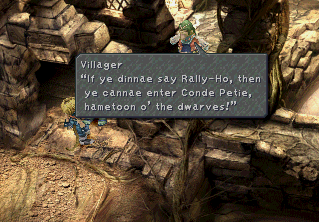
The PlayStation port of Final Fantasy IV came out shortly after Final Fantasy IX, and it uses “Rally-ho” as well:

But the Game Boy Advance port of Final Fantasy IV, which used the PlayStation script as a base, reverts back to “Lali-ho”:

“Lali-ho” remained intact in the Nintendo DS release of the game:
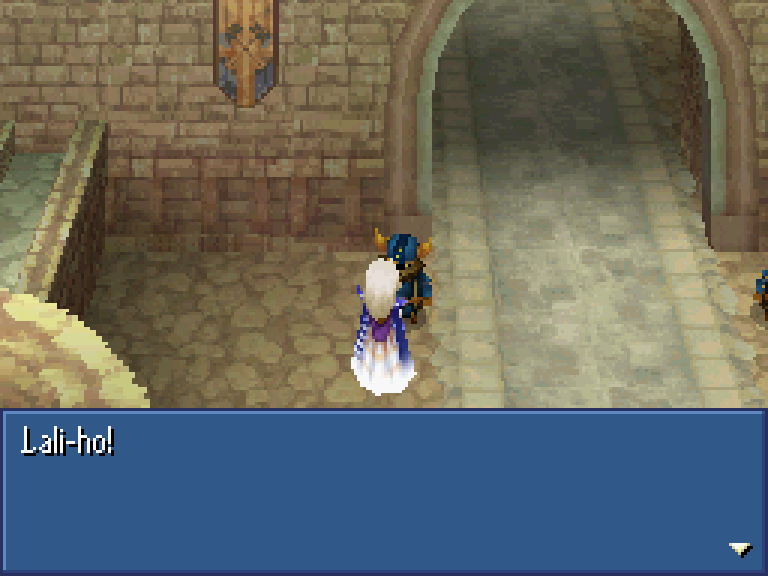
It was the same in the PSP release:

And “Lali-ho” was the word of choice in the Nintendo DS version of Final Fantasy III:
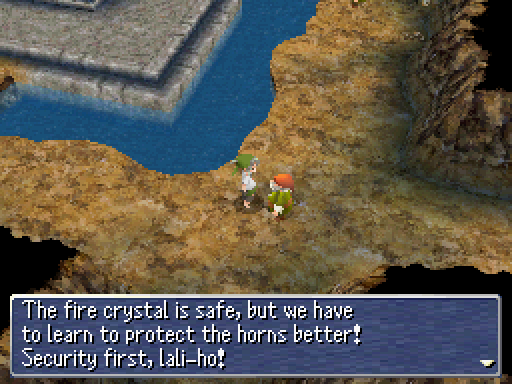
And it remained that way in subsequent Final Fantasy III releases:
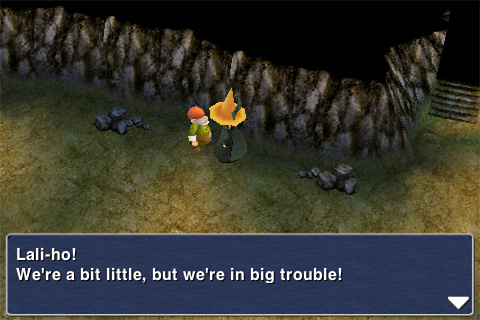
So it seems that all official translations have converged around “Lali-ho” from the start, except for during one little blip in the early 2000s.
Extra “Lali”s
“Lali-ho” is a common phrase in this castle, but not every dwarf says it in Japanese. These non-Lali-ho dwarves do retain their unique vowel elongation speech pattern, however. Because this vowel elongation isn’t retained in the localization, someone on the localization team added “lali” and “ho” to the ends of such sentences to compensate. Let’s look at some examples.
We can see that a “Lali” was added here as its own new sentence:
 |  |
| Final Fantasy IV (Super Famicom) | Final Fantasy II (Super NES) |
And a “Lali” was appended to the last sentence here:
 |  |
| Final Fantasy IV (Super Famicom) | Final Fantasy II (Super NES) |
And a “Lali” was appended to this line in the same way:
 |  |
| Final Fantasy IV (Super Famicom) | Final Fantasy II (Super NES) |
In each case, the word “Lali” is nowhere to be found in the original Japanese text. It would’ve been simple and easy to leave these lines as plain, literal translations, but the translators – or perhaps the editors – picked up on the overall theme of the area and used that to adapt the English text to retain that theme.
Being able to see the bigger picture like this is a sign of a thoughtful translator, so whoever was responsible had some skill. In fact, these thematic text changes are very similar to the often-heralded “XXXterday quiz” in EarthBound, but are much less obvious.
That said, there were some related problems. For example, some lines that had “Lali” in them lost them in translation:
 |  |
| Final Fantasy IV (Super Famicom) | Final Fantasy II (Super NES) |
And in one case, an added “Ho” gives a dwarf’s line an unintended new meaning:
 |  |
| Final Fantasy IV (Super Famicom) | Final Fantasy II (Super NES) |
Dwarf King’s Name
 |  |
| Final Fantasy IV (Super Famicom) | Final Fantasy II (Super NES) |
The king of the dwarves is known as “Giott” in the English releases. In English, names like this that start with “gi” pose a problem: should it be pronounced with a hard “G”, as in “gift”, or should be it be pronounced with a soft “G”, like “ginger”? Consonant and vowel pronunciation isn’t as ambiguous in Japanese, so based on the Japanese name it’s clear that the intended pronunciation here is “Jiott”.
Counting Dwarf
A dwarf near the castle’s entrance wants to do the dwarf greeting with Cecil’s party:
 |  |
| Final Fantasy IV (Super Famicom) | Final Fantasy II (Super NES) |
| Japanese Version (basic translation) | English Version |
| Let’s do it together! | Together |
| Ready… | 3-2-1! |
| Lali-ho! | Lali-ho! |
In the original release, the dwarf’s second line is せーのー (sēnō) which is the Japanese phrase said before getting people to do or say something at the same time. There’s no 100% exact equivalent in English (and apparently it might have French origins), so it’s always interesting to see how different localizers handle it. Sometimes it’s as simple as “Ready…” or as specific as “Heave-ho!” In this case, we see that the translators went with a countdown, which is a neat solution.
That aside, the first line of the translation could probably have used punctuation of some sort.
Blocking Dwarf
A dwarf blocks a staircase when Cecil’s party first enters the castle:
 |  |
| Final Fantasy IV (Super Famicom) | Final Fantasy II (Super NES) |
| Japanese Version (basic translation) | English Version |
| This is an important room! | Authorized dwarves only! |
| You’re not allowed in! |
This is a clever attempt at reducing the amount of text in a translation while including a bit of lightheartedness to it. The Japanese speech pattern isn’t conveyed in the dwarves’ English lines, so this is a surprising little compromise.
Wondering Dwarf
A dwarf talks about the local goods:
 |  |
| Final Fantasy IV (Super Famicom) | Final Fantasy II (Super NES) |
| Japanese Version (basic translation) | English Version |
| Dwarf items are strange! | Dwarf items are strange! |
| I wonder if humans can master using them! | Can you use it okay? |
The English translation is pretty good. There’s a pronoun disagreement problem in the second line but it’s minor.
The big thing that stands out here is the first Japanese line – it uses the word “fushigi” to describe the dwarven items. This is another one of those words that’s hard to pin down with one English word – it encompasses everything from “strange” to “mysterious” to “wondrous” to “magical”. There’s almost never one “correct” translation, it always depends on context. In this case the translators went with “strange”.
Similar lines can be found elsewhere in the castle. In all of these cases, the word “humans” is translated as “you”:
 |  |
When I first played the English translation, I never stopped to think that this “you” was meant in this general “all you humans” way. I just assumed it was referring specifically to Cecil and/or whoever was leading the party. Looking back now that I’m a translator, I’ve learned that this is a common risk that comes with using “you” in Japanese-to-English translations.
Treasure Changes
There are many hidden treasures in the dwarves’ castle, and many of them were changed during the jump to the Easy Type and English releases:
 |  |
| Final Fantasy IV (Super Famicom) | Final Fantasy II (Super NES) |
| Location: | Final Fantasy IV | Final Fantasy IV Easy Type | Final Fantasy II |
| Castle, 2nd Floor | 5000 Gil | 1000 Gil | 1000 GP |
| Right Tower, 4th Floor | Bacchus’ Wine | 500 Gil | 500 GP |
| Right Tower, 5th Floor | Silver Hourglass | Ether Dry | Ether2 |
| Left Tower, 4th Floor | Bacchus’ Wine | 500 Gil | 500 GP |
It looks like the Easy Type and English versions had a couple treasures replaced with money. And the existing 5000 Gil treasure was dropped down to 1000 Gil.
Meeting the King
Cecil and pals finally meet the king. Upon their meeting, Cecil says:
 |  |
| Final Fantasy IV (Super Famicom) | Final Fantasy II (Super NES) |
| Japanese Version (basic translation) | English Version |
| Who are you? | May I ask who you are, sir? |
This translation is particularly interesting, as it shows more politeness than the original Japanese line, in a way that definitely suggests a native English speaker came in and was like, “Hmm, he’d probably say something different if this were written in English originally.” and then rephrased it to match. It’s beginning to look like this entire area of the game got a quick editing pass by a native English speaker at one point.
The jump from “clunky translation” to “thoughtful localization” in the console game industry didn’t happen overnight – it was a gradual process. And this is a little example of that process taking place. This style of localization – context-based rephrasing instead of source-parroting – is the standard these days.
In addition to this, several lines during this scene with King Giott were changed during the transition to the Easy Type release:
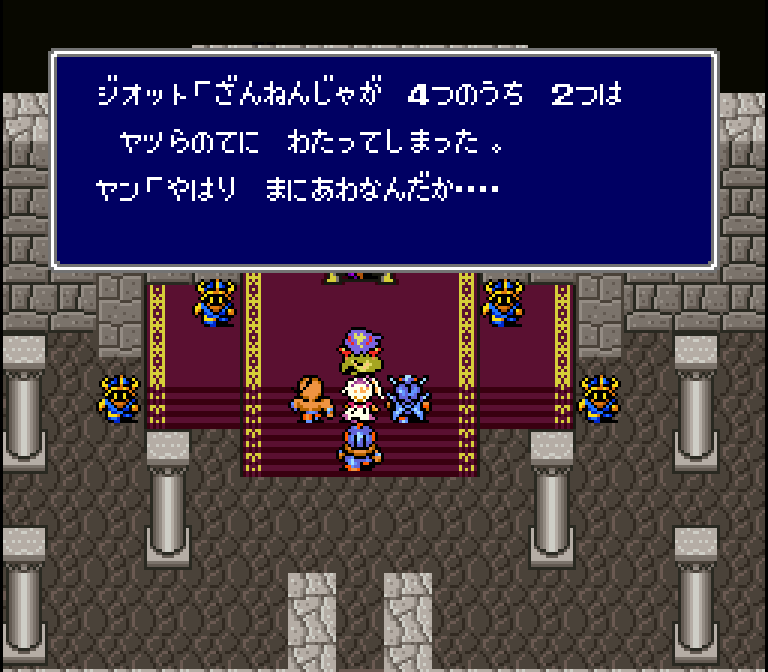 |  |
| Final Fantasy IV (Original) | Final Fantasy IV (Easy Type) |
First, Yang says, “So we didn’t make it in time…” in the original script, but in a rather non-standard way. To clear up any confusion and to make sure players could 100% understand it, his line was rephrased to use the standard way of saying the phrase.
A little bit later, Cid mentions that he needs to reinforce the airship to handle the heat of this underground world. In the original Japanese script, he uses the word for “hull”, but in the Easy Type script, he uses the word “airship”:
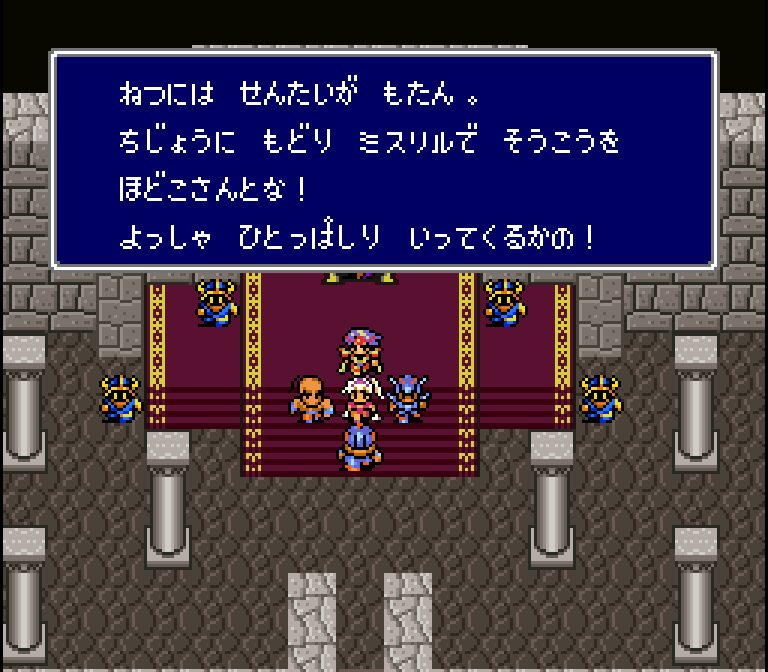 |  |
| Final Fantasy IV (Original) | Final Fantasy IV (Easy Type) |
Before Cid leaves, Rosa tells him to be careful:
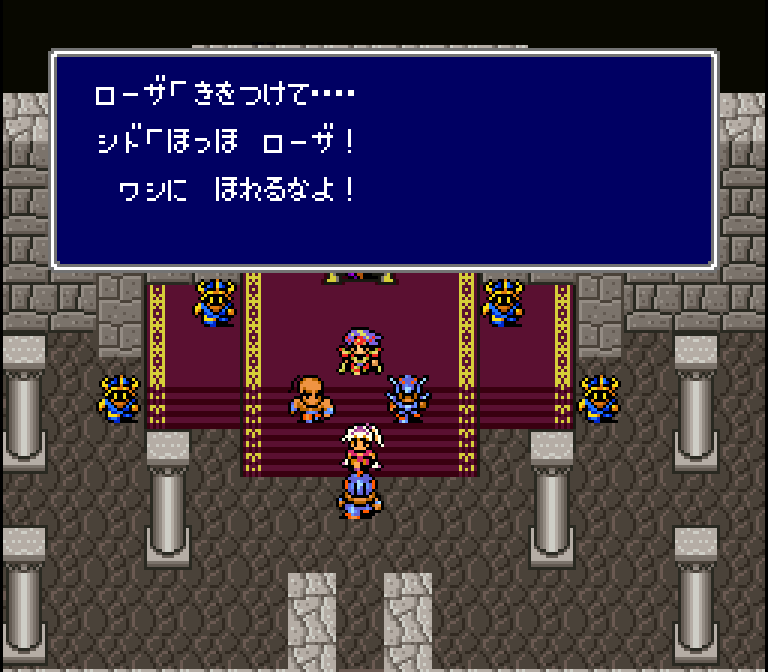 |  |
| Final Fantasy IV (Super Famicom) | Final Fantasy II (Super NES) |
| Japanese Version (basic translation) | English Version |
| Rosa: Be careful… | Rosa: Take care… |
| Cid: Ho-ho! Rosa! Don’t fall for me now, ya hear! | Cid: Thanks, Rosa! |
The text was most likely changed due to length issues, but the original line does give him more of a comedic, lighthearted vibe.
Another line was altered slightly for the Easy Type release:
 |  |
| Final Fantasy IV (Original) | Final Fantasy IV (Easy Type) |
| Final Fantasy IV (basic translation) | Final Fantasy IV Easy Type (basic translation) |
| Cecil: King Giott. Where exactly is this castle’s crystal? | Cecil: King Giott. Where exactly is this castle’s crystal? |
| Giott: It’s in a hidden room behind this throne, as a matter of fact! | Giott: It’s in a hidden room behind this one, as a matter of fact! |
The Japanese word for “throne” was removed to simplify the text a little bit. For added clarity, a space was added to Cecil’s Japanese line as well.
Calbrena / Calcobrina
The heroes head into the secret room… but the door suddenly locks behind them! Some creepy dancing dolls appear and taunt the party:
 | 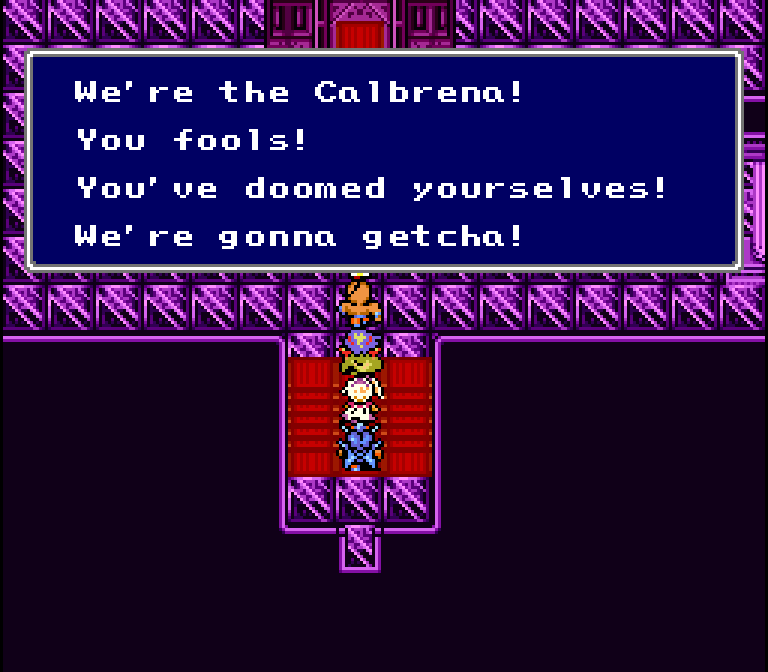 |
| Final Fantasy IV (Super Famicom) | Final Fantasy II (Super NES) |
| Japanese Version (basic translation) | English Version |
| “Kya-hohoho.” | Yip-ho-ho-ho! |
| Cecil: ? | Cecil: ? |
| Rosa: Dolls! | Rosa: Oh! The dolls! |
| “We’re the cheerful Calcobrina!” | We’re the Calbrena! |
| “And we’re scary, adorable dolls!” | |
| “Fools!” | You fools! |
| “This is what you get for waltzing right in here!” | You’ve doomed yourselves! |
| “We’re gonna beat you and…” | We’re gonna getcha! |
| “…make you our gift to Master Golbeza!” | We’ll take this good news |
| “Kya-hoho!” | Yip-ho-ho-ho! |
A few things of note:
- The calculated change in laughter and the phrasing used in the English script definitely indicates a native speaker went through this scene as well.
- Because of the way the Japanese text is presented, it’s clear that multiple dolls are talking one after another. That presentation is lacking in the English release – and in the literal translation above – because English doesn’t have the same kind of punctuation mark that’s used in Japanese. Because of this, it’s likely that many English-speaking players assumed it was all of the dolls speaking at once, or that it was just one doll speaking for them all. Incidentally, this same text translation quirk appears in other Square games’ translations, like in Final Fantasy VI, for example
- One original line was dropped from the dolls’ speech, but their number of lines increased overall.
- The dolls’ name was changed in order to match with their name in battle. Battle names are limited in length, so “Calcobrina” became “Calbrena”. Incidentally, this name appears to be another reference to the “Divine Comedy”, in which one of the “Malebranche” is named Calcabrina. Interestingly, this potentially places the dolls on or near the same level as the four elemental fiends, who were also named after Malebranche.
After the dolls are defeated in battle, they have some last words to share:
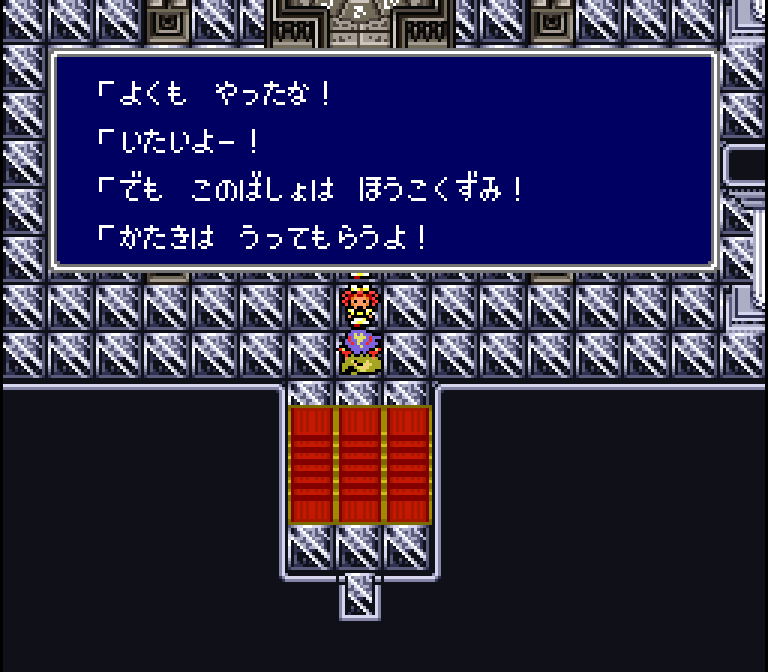 | 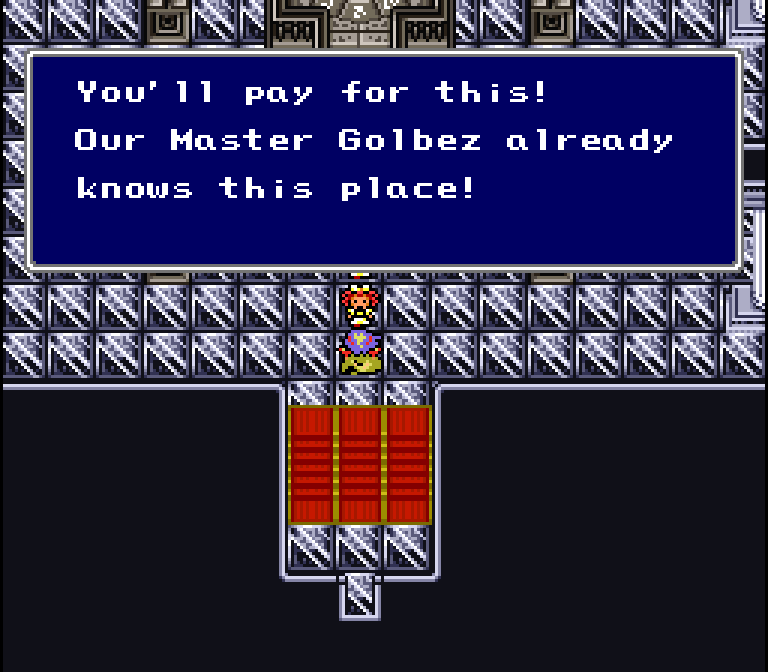 |
| Final Fantasy IV (Super Famicom) | Final Fantasy II (Super NES) |
| Japanese Version (basic translation) | English Version |
| “You’ll pay for this!” | You’ll pay for this! |
| “That hurts!” | |
| “But we’ve already reported about this location!” | Our Master Golbez already knows this place! |
| “He’s gonna avenge us!” | |
| “Master Golbeza!” | |
| Cecil: What!? | Cecil: What!? |
A few lines here were dropped from the English translation. Although it’s nothing major, the fact that Golbez suddenly appears after this always felt kind of jarring – it turns out it was because the dolls had also reported to Golbez and were calling out to him during this scene.
Golbez Arrives
Golbez’s voice echoes in the crystal room:
 | 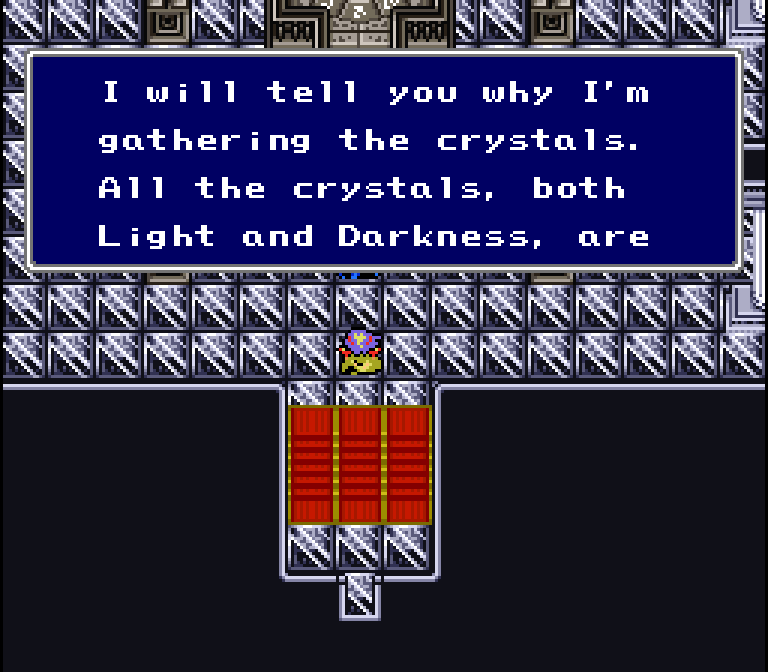 |
| Final Fantasy IV (Super Famicom) | Final Fantasy II (Super NES) |
| Japanese Version (basic translation) | English Version |
| We meet again… | Well, Cecil… |
| Cecil: Golbeza! | Cecil: Golbez…! |
| Golbeza: You bested me the other day. But the Meteo user is no more. | Golbez: You got me the other day, but now the old mage is gone. |
| As appreciation for earlier, I will tell you why I am gathering the crystals. | I will tell you why I’m gathering the crystals. |
| The Light and Dark Crystals, eight in all, are the key to reactivating the sealed path that leads to the moon: the Tower of Babil. | All the crystals, both Light and Darkness, are the keys to reactivating the Tower of Bab-il that leads to the moon. |
| It is said that the moon holds a power beyond human comprehension. | It is said that the moon possesses powers beyond our human comprehension. |
| With this crystal, I now have seven… That leaves only one more. | And there is only one more crystal to get. |
| Once again, it is because of you that I have obtained another crystal. I must thank you for this as well. | You’ve been very helpful. |
| Take this! This is my final gift to you! | Receive your last reward! |
I’m quite impressed with how this turned out. Some minor details were shaved off, but the basic facts and the phrasing properly fit Golbez’s character. Some of the wording choices make me certain that the scene has been edited and rephrased by a native English speaker. Some of the smug and confident remarks have been toned down due to text limitations, but Golbez’s intimidating, yet slightly sarcastic personality still remains intact.
The official English phrasing about the tower is a little confusing, though. It makes it sound like the tower literally connects to the moon, when it’s more of a vague “path” or “way” to the moon. Although I’m honestly still a bit confused on why it’s considered a path to the moon when all that happens is that a giant killer robot comes out of it.
The Easy Type version of this scene features another text change:
 |  |
| Final Fantasy IV (Original) | Final Fantasy IV (Easy Type) |
| Final Fantasy IV (basic translation) | Final Fantasy IV Easy Type (basic translation) |
| It is said that the moon possesses powers beyond our human comprehension. | It is said that the moon possesses powers beyond our imagination. |
We can see that the Japanese word for “human comprehension” was replaced with the simpler word for “imagination”.
The fan translation takes some liberty with the scene and with Golbez’s text in particular. Golbez does have a tiny bite of sarcasm in his Japanese text, as we’ve seen above, but in this unofficial translation the sarcasm has been kicked up a few notches:

| Japanese Version (basic translation) | J2e Fan Translation |
| We meet again… | ‘Well, well, well…’ |
| Cecil: Golbeza! | Cecil: Golbez…! |
| Golbeza: You bested me the other day. But the Meteo user is no more. | Golbez: Look who decided to show up. I really must thank you for the other day. How could you possibly know that I love having meteors dropped on my head? But now that old bastard is dead… |
| As appreciation for earlier, I will tell you why I am gathering the crystals. | Before I unmercifully and painfully slaughter you, wouldn’t you like to know why I’m gathering the crystals? |
| The Light and Dark Crystals, eight in all, are the key to reactivating the sealed path that leads to the moon: the Tower of Babil. It is said that the moon holds a power beyond human comprehension. | It is said that when all eight Crystals of the Earth, both the Light and the Darkness, are gathered, the way to the Moon will open… |
| With this crystal, I now have seven… That leaves only one more. | |
| Once again, it is because of you that I have obtained another crystal. I must thank you for this as well. | Golbez: Unimaginable power awaits there… |
| Take this! This is my final gift to you! | But, of course, you stand in my way. |
The fan translation actually amps up Golbez’s character in other ways too, and even adds a specific motivation for Golbez that was never there in the original. I can kind of appreciate what the translators were going for here – staying literal is often pretty bland and uninteresting, but I’m not sure making things up out of the blue is the best way to compensate. At least not in something as important as this scene, anyway.
Golbez Battle
Cecil’s party is forced into a battle with the fearsome Golbez. With Tellah now gone, however, Golbez easily overwhelms them:
 | 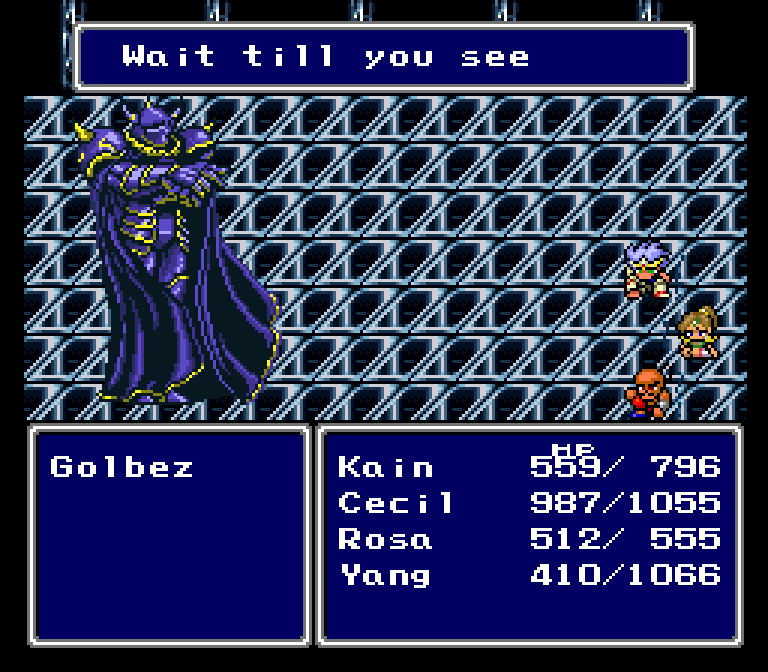 |
| Final Fantasy IV (Super Famicom) | Final Fantasy II (Super NES) |
| Japanese Version (basic translation) | English Version |
| Ha ha ha. | HA HA HA! |
| Is this the extent of your strength? | Is that it? |
| Now, to fetter you for a bit! | Now ……! |
| Golbez paralyzes the party with a spell | |
| You are incapicitated, but your sight remains intact. | Wait till you see |
| Now you will experience true terror! | the real terror! |
| Come, Black Dragon! | Meal time, Shadow! |
| A dragon appears and kills each party member one by one until only Cecil remains | |
| And now for you, Cecil! | And you, Cecil! |
Many of the small differences here are simply due to the fact that in-battle text boxes have severe length limitations. What’s most interesting, though, is how Golbez uses the informal-sounding “till” in English. It feels out of place for this character and this scene. It also suggests that a native English speaker edited this line – a theory that is bolstered by the use of “meal time” shortly after.
Just before the evil dragon can kill Cecil, a mist dragon appears and destroys it. Golbez is shocked by this sudden turn of events. From out of nowhere, a voice calls out to Cecil:
 |  |
| Final Fantasy IV (Super Famicom) | Final Fantasy II (Super NES) |
| Japanese Version (basic translation) | English Version |
| ????: You can move now! | ????: You can move now! |
| Cecil: That voice… | Cecil: Who is it…? |
The “????” character who has saved the day turns out to be Rydia, who isn’t dead after all – in fact, she’s somehow now an adult! Although the English version of her line seems identical to the Japanese version of her line, there’s one small difference: the Japanese line uses a feminine speech pattern. From this, Japanese players could glean some extra info from the scene before the surprise reveal. Since the English language doesn’t have such profoundly different gender-based speech patterns, this info is lost in the translation. Even if there had been some way to retain this information, though, the limited size of the text would probably have been problematic anyway.
There’s another small difference here too: In Japanese, Cecil seems to recognize the voice, possibly thanks to the extra speech pattern info. The English line keeps Cecil in the dark, potentially to make the reveal even more surprising.
Rydia Returns
After Golbez is defeated, the battle scene ends and the party is re-introduced to Rydia. The English translation here is surprisingly close to the original text, with only a few details left out. For example, the fact that Rydia became friends with the summoned monsters was left out, most likely due to space limitations.
More interesting, though, is how a short piece of this scene was translated in the English PlayStation release:
 | 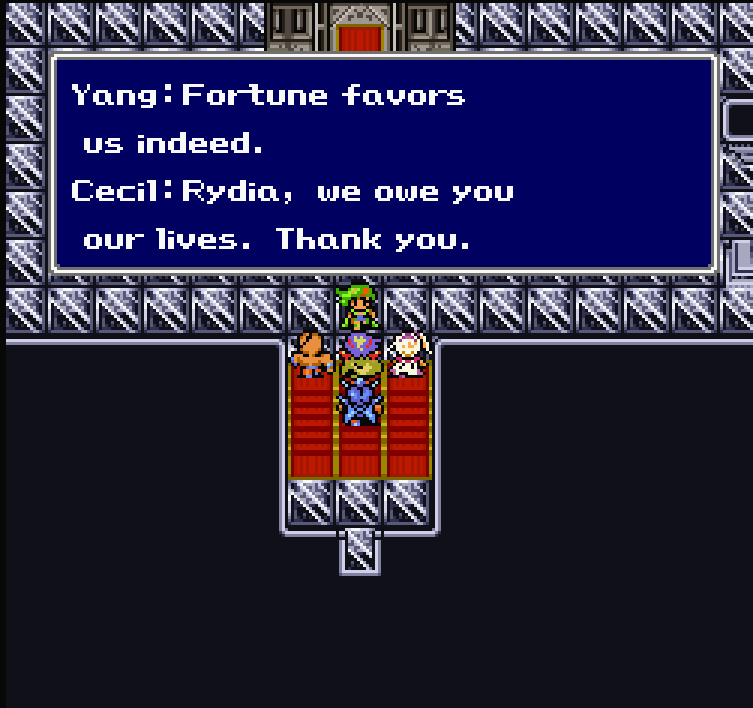 |
| SFC Japanese Version (basic translation) | PlayStation translation |
| Yang: What a surprise this is… | Yang: Fortune favors us indeed. |
| Cecil: But why did you help us? I killed your mother… | Cecil: Rydia, we owe you our lives. Thank you. |
These dialogue changes effectively dropped Yang’s surprise and Cecil’s confusion from the scene. The fact that Cecil is still haunted by his past actions in Mist is removed as well.
For fun, I checked to see how the fan translation handled this. Things were changed here and there, some for the better (naming choices, such as “Leviathan” and “Phantom World”), and some for the worse:

Yang’s surprise is intact, but now his very first comment about Rydia is about her new attractiveness. It’s not necessarily an absurd line, but it seems out of character for a stoic monk master like Yang to say. If anything, it comes across as something Edge would say.
Golbez’s Hand
Golbez has been defeated, the crystal has been protected, and all seems well. Until Golbez’s detached hand flies off and steals the crystal:
 |  |
| Final Fantasy IV (Super Famicom) | Final Fantasy II (Super NES) |
After this happens, Cecil reacts in English with, “Oh, my! He took the crystal!” This “oh, my” translation choice isn’t wrong, but it doesn’t fit the scene or Cecil’s character very well.
In situations like this, it’s common to see this Japanese phrase translated as “oh no!” or “crap!” or something along those lines that indicates a higher level of distress. Surprisingly, this first sentence is left out of all translations after the Super NES translation, including the fan translation. This is because the second sentence is able to convey the urgency of the situation by itself in translation – you could even argue that it sort of “absorbs” the feeling and intention of the first phrase.
Mistranslated Directions
Cecil and friends return to King Giott to give him the bad news. The king mentions that there’s only one crystal that Golbez hasn’t obtained yet, and that it’s in a cave. His explanation has a genuine mistranslation, though:
 |  |
| Final Fantasy IV (Super Famicom) | Final Fantasy II (Super NES) |
| Japanese Version (basic translation) | English Version |
| It’s in a sealed cave to the southwest. | In the Sealed Cave of northwest. |
| Golbeza is headed there, but there is no cause for panic. | But do not worry. |
| The cave cannot be entered without the key to break its seal. | The cave cannot be entered without the key. |
As per usual, the English script drops some details to fit within certain technical limitations… but the king also gives the wrong directions in the English version! The word for “southwest” was mistranslated as “northwest” – most likely because the translator was thinking about the next destination in the story, which is the big tower to the northwest.
This translation mistake was fixed in every English version after the Super NES translation. For some reason, the fan translation drops all mention of the direction.
Several lines in this scene were revised for the Easy Type release. First, the word for “recover” or “reclaim” was simplified with the word for “take back”:
 |  |
| Final Fantasy IV (Original) | Final Fantasy IV (Easy Type) |
In the original Japanese script, Yang shares a fancy proverb that uses “ye olden times” Japanese. The proverb translates literally as “One may not catch a tiger cub without entering a tiger’s lair.” For the Easy Type release, this proverb was replaced with a simpler, more standard phrase that means “waiting around will get us nowhere.”:
 |  |  |
| Final Fantasy IV (Super Famicom) | Final Fantasy IV Easy Type (Super Famicom) | Final Fantasy II (Super NES) |
Incidentally, the Super NES English translation doesn’t include an equivalent old proverb. In all later translations, including the fan translation, references to the English proverb “nothing ventured, nothing gained” are used.
Another line was changed for the Easy Type release. In the original script, Giott says, “We’re praying for your luck in battle!” In the Easy Type script, this was changed to “We’re praying for your safety!”:
 |  |  |
| Final Fantasy IV (Super Famicom) | Final Fantasy IV Easy Type (Super Famicom) | Final Fantasy II (Super NES) |
In the English translation, the reference to praying was removed, and the line rephrased as “Go whenever you’re ready. Good luck!” This “good luck” translation choice is pretty common in situations like this, though, so it’s possible it wasn’t rephrased for content reasons but simply as part of standard translation practice.
Crystal Trick
There’s a nifty trick you can perform at this specific part in the game. If you use Rydia’s Dejon/Warp spell to leave right after the scene with King Giott, the stolen crystal will somehow still be in the Dwarf Castle crystal room when you return. Checking the crystal will put the Dark Crystal key item into your inventory, which will let you skip almost all of the Sealed Cave part of the game:
 |  |
| Final Fantasy IV (Super Famicom) | Final Fantasy II (Super NES) |
This bug exists in the original Japanese release and the English Super NES translation. It was fixed for the Easy Type release, however, and the various remakes and ports have fixed this problem as well.
Meeting Luca
Luca, King Giott’s daughter, laments the fate of her dolls:
 |  |
| Final Fantasy IV (Super Famicom) | Final Fantasy II (Super NES) |
| Japanese Version (basic translation) | English Version |
| How dare he use my dolls like that! He’s going to pay! | Oh, my dolls… |
The Japanese line can be translated many different ways, but it’s clear that the English translators had to really trim the text down here.
Treasure Dwarves
A dwarf guards a bunch of treasures in a castle tower. The English translation of his line is almost the same as the Japanese line, but I thought I’d include it here anyway:
 |  |
| Final Fantasy IV (Super Famicom) | Final Fantasy II (Super NES) |
| Japanese Version (basic translation) | English Version |
| You guys are fighting Golbeza too? | Fighting against Golbez? |
| _ | Then you’re our ally! |
| Take the treasures here and do your best! | Take the treasures! |
In this case, a sentence was added, but the meaning is essentially the same.
Another dwarf in another tower has a similar line:
 |  |
| Final Fantasy IV (Super Famicom) | Final Fantasy II (Super NES) |
| Japanese Version (basic translation) | English Version |
| King Giott has given his permission! | King Giott permits you to take the treasures! |
| Use the treasures here with care! |
In this case, a sentence was dropped.
In both cases, the dwarves speak in Japanese with elongated sentence-ending vowels, but the English lines lack any unique dwarven speech characteristics.
Pub / Cafe
Behind the weapon and armor shop is a special room that’s easy to miss at first. It turns out that this room was meant to be a pub, but this was of course changed to a cafe in the Super NES translation:
 |  |
| Final Fantasy IV (Super Famicom) | Final Fantasy II (Super NES) |
In the original Japanese release, it’s known as “Pub Lali-ho!”. In the English Super NES release, it was named “Cafe HOWDY!”.
For some odd reason, this instance of “Lali-ho” was replaced with an actual English word. It’s possible that the location names were translated by a different team member than whoever did the main script. This would explain the abrupt inconsistency. Normally, an editor might catch this inconsistency, so the fact that it got through also suggests that whoever did the editing didn’t give close attention to location names.
The pub has gone by different English names over the years. For example, the PlayStation translation calls it the “Rally-ho Pub”:

And the Game Boy Advance version calls it the “Lali Ho Pub”:

The DS translation calls it the “Lali-ho Pub”:

And the fan translation went with “‘Laliho’ Pub”:

Even my 100% machine-translated version of Final Fantasy IV gave it a new name!
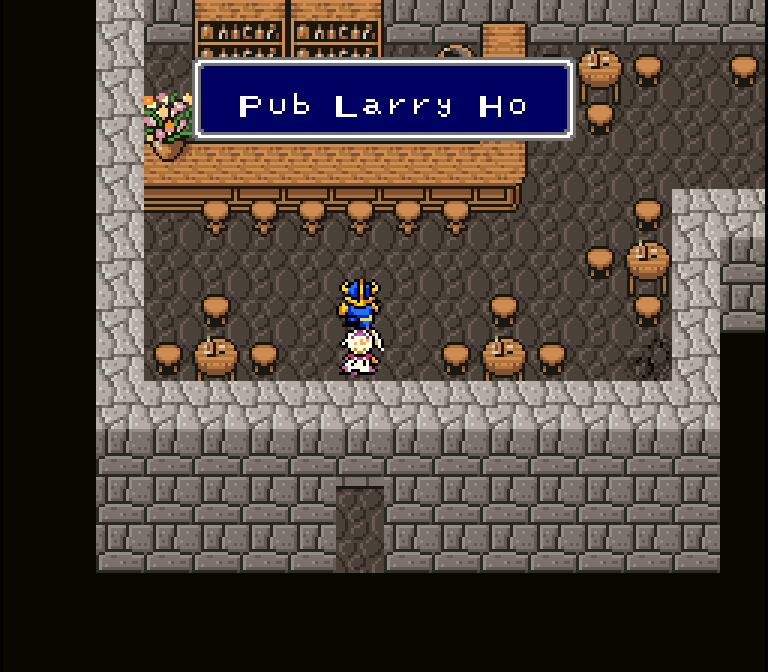
I get the feeling that the DS translation will serve as the base translation for most future ports and re-releases from now on, so it’ll probably stay at “Lali-ho Pub” for many years to come.
Party Dwarf
The dwarf in the pub/cafe has some different text in the English translation:
 |  |
| Final Fantasy IV (Super Famicom) | Final Fantasy II (Super NES) |
| Japanese Version (basic translation) | English Version |
| Hic! Everyone is so focused on “war this” and “war that” that they don’t drink at all! For me, booze is more important than fighting! | Let’s party! |
We can clearly see that the text was heavily trimmed and the alcohol references were removed.
Fat Chocobo
The dwarves seem to view the fat Chocobo as a deity. One dwarf describes it:
 |  |
| Final Fantasy IV (Super Famicom) | Final Fantasy II (Super NES) |
| Japanese Version (basic translation) | English Version |
| The great and wonderful one appears here and will hold on to anything at all for you! | A Big Chocobo will come here and hold your belongings! |
In the Japanese line, the dwarves’ reverence for the Chocobo is clear, but the dwarf doesn’t mention the name “Chocobo” at all. Instead, he refers to the creature in a very respectful way in Japanese that’s a little tricky to translate in this context. In contrast, the reverence isn’t apparent in the English line, and the fat Chocobo is bluntly referenced by name.
Another dwarf talks about the fat Chocobo:
 |  |
| Final Fantasy IV (Super Famicom) | Final Fantasy II (Super NES) |
| Japanese Version (basic translation) | English Version |
| Fat Chocobo? How rude! Here, it’s the God Bird! | Big-Chocobo!? No-no! Here it’s the bird of sacred, Lali! |
The word “god” was changed to “sacred” at some point, but the sentence wasn’t reordered to fit the new phrase, resulting in a very awkward and grammatically odd sentence.
We can also see that a “Lali” was added to the translated line. Based on what I’ve read about the game’s translation schedule, I would guess that both the “god” change and this “Lali” change happened at the same time.
There’s also a strange inconsistency here: the other dwarf called it the “Big Chocobo”, but in this line it’s spelled with a hyphen instead of a space.
Healing Room
There’s a room in the castle full of beds and resting dwarves. In Japanese, it’s called the kyūgoshitsu, which isn’t too unusual of a word, but it’s a good example of a term that has like a dozen or more possible translations.
In the Super NES translation, the word is translated as “nursing room”:
 |  |
| Final Fantasy IV (Super Famicom) | Final Fantasy II (Super NES) |
The PlayStation, GBA, and DS versions call it the “infirmary”. The fan translation calls it the “medical room”.
 |  |  |
| Playstation Translation | GBA Translation | DS Translation |
Other translations of the word that I’ve seen in other situations include:
- Aid station
- Dressing station
- Dispensary
- First-aid center
- First-aid office
- Medical office
- Medical clinic
- Hospital
- Shelter
This is a very specific example, of course, but this sort of thing happens on a much broader scale during every localization. So if you’ve ever played a game that’s been re-translated or is a remake of an existing game, this is why some of its terms might be different from what you’re used to.
Cannon Dwarf
A dwarf near the castle’s exit shares some information about the upcoming destination:
 |  |
| Final Fantasy IV (Super Famicom) | Final Fantasy II (Super NES) |
| Japanese Version (basic translation) | English Version |
| There’s a terribly big cannon in the Tower of Babil! | The Tower of Bab-il has a huge cannon called the Super Cannon! |
In the Japanese line, the cannon is left unnamed, but it’s given a name in the English line. Unlike many other lines in the translation that had to be heavily trimmed, this one was actually made longer and had more information added to it.
Underground / Chitei
 |  |
| Final Fantasy IV (Super Famicom) | Final Fantasy II (Super NES) |
In the Japanese script, this underworld area is known as the 地底 (chitei). This literally means “land’s/earth’s bottom”, but is more often translated as “Underground” or “Underworld”. The Super NES translation follows this trend by calling it the “Underground”.
The Super NES translation isn’t always consistent with the name’s capitalization, however:
 | 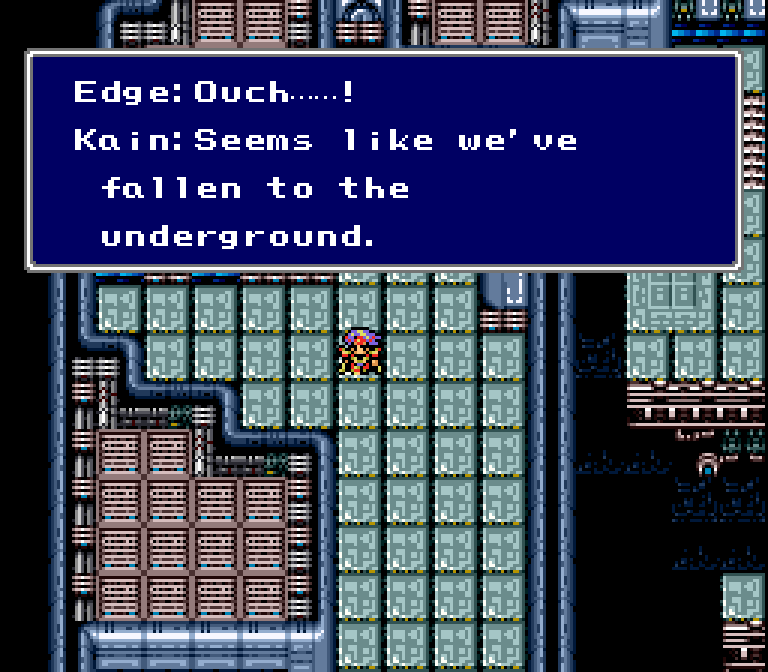 |
Four Heavenly Kings
Another dwarf shares some more information about the tower:
 |  |
| Final Fantasy IV (Super Famicom) | Final Fantasy II (Super NES) |
| Japanese Version (basic translation) | English Version |
| Even if Golbeza isn’t in Babil, Rubicante of Fire, the most powerful of the Four Heavenly Kings, is there! | I know Golbez is out of Bab-il! But the strongest of four fiends called Rubicant of Fire is there! |
The lines are very similar, but the English text has some phrasing issues – possibly owing to text limitations – that make it feel a little awkward. The important information is conveyed, though, and I can feel “heart” in the translation.
Pot of Life
A dwarf and a giant pot stand near the castle’s exit. The dwarf explains what it is:
 |  |
| Final Fantasy IV (Super Famicom) | Final Fantasy II (Super NES) |
| Japanese Version (basic translation) | English Version |
| This pot is the Pot of Life! | This is the Pot of Life, Lali! |
| Drink this water before you go! | Wanna sip? |
The main point of interest here is that the Japanese script clarifies that the pot has some sort of water in it. Since the castle has a strong dwarf theme, for a long time I assumed it was some sort of mead or alcohol that was left unmentioned.
Secret Development Room
The original Super Famicom version of Final Fantasy IV features a secret “Developer’s Room” that can be accessed via a secret passageway in the pub. This special location was removed for the Easy Type and English releases:

Unsurprisingly, the Developer’s Room is inhabited by a number of staff members who share special messages that break the fourth wall. Some characters walk around like ordinary NPCs that you can talk to, while other staff members appear during random battles that occur as you walk around the area:
 |  |
A full list of all the staff members, their roles, their messages, and related information is beyond the scope of this article, but you can see a full list of everything see here.
The Developer’s Room has appeared – and been translated – in almost every version of Final Fantasy IV after Easy Type and the Super NES release. Although I haven’t fully verified it myself, it sounds like the Developer’s Room remained mostly unchanged in every version of the game, except the 3D versions, which use new staff members.
Although the text in the Developer’s Room has been translated in many versions of the game, it’s important to note a few things:
- Naturally, the fan translation includes this room. The quality of the translation isn’t half-bad, but a few details get messed up or lost.
- In the PlayStation translation, almost all of the text in the Developer’s Room has been extremely abbreviated/trimmed.
- Although the GBA translation is usually based on the PlayStation translation, it appears that the Developer’s Room got a retranslation that also borrowed some phrasing from the PlayStation translation. If you’re looking for the best original Developer’s Room translation, this is the one I’d recommend for sure.
- The PSP version appears to be based on the GBA version. I haven’t played this version myself yet, but it looks like the battles might be handled a bit better, since the text/names can be longer in this version.
There’s also a curious line in the Developer’s Room that has troubled everyone everywhere. Hironobu Sakaguchi, the game’s director, appears in the Developer’s Room as an odd-colored Chocobo:

In Japanese, he says: しよか… (shiyoka...). This is a mysterious phrase with an unclear meaning. Even Japanese fans aren’t sure what it indicates – it could mean many different things, or maybe even nothing at all. Here are some of the prevailing Japanese theories about the line:
- He’s responding to another staff member’s mention of skipping a major, week-long holiday to keep the game on schedule – in which case his line could be taken as “Maybe we should do that.”
- It’s unverified, but there’s a claim that Sakaguchi said this phrase all the time in the sense of “Let’s go with that, then.” during the game’s development, to the point of it being one of his characteristic phrases around the office.
- It’s possibly a line said out of exhaustion, as if he’s saying with a sigh of resignation, “Let’s do this, I guess.” In this theory, he’s so incredibly tired but knows that unless he keeps working, the work will never end.
- He’s reluctantly agreeing to being assigned a Chocobo sprite
- It’s a phrase that means “Oh, these specs…”
- Maybe he’s uttering nonsense after burning himself out
Although some of the theories can be lumped together as generally meaning “let’s do (something)”, it’s unclear what that something is or who he’s saying it to. This is yet another mystery among Japanese fans. As such, there are lots of theories about the line’s specific meaning, but if native Japanese-speaking fans can’t pin down what it’s saying, then translators who don’t speak the language natively have much less of a chance of figuring it out. With huge scripts and tight deadlines, lines like this can be a translator’s nightmare: you can’t just skip what you can’t figure out – you gotta write something. But what, and why?
This kind of situation happens more often than you might think in the entertainment translation industry. Sometimes you might have the benefit of being able to ask the creator or someone else in charge, but it usually boils down to doing all the research you can and then making your best educated guess, or trying to work around the problem as unobtrusively as possible.
This line by Sakaguchi serves as a good, simple example of working around the undecipherable in translation, as we can see in the different releases:

The original PlayStation translator probably had trouble with this line and eventually decided to go with the safe “Kweh” Chocobo sound for the translation. Their thinking was probably, “The original line isn’t clear to begin with, nobody will really notice if I put ‘Kweh’, and it’ll still fit the situation well.”
The GBA translator re-translated most of the text in this secret area, but left this line untouched from the PlayStation translation:

The thought process here was probably, “Yikes, I can’t figure out what’s being said in the Japanese script! I’m not sure why the PlayStation translation went with ‘Kweh’ but maybe there was a good reason, so I guess I’ll go with it too.”
The staff in charge of the PSP translation seems to have taken the same approach:

Similarly, the fan translation replaced the puzzling line with a simple greeting that wouldn’t seem out of place in the given situation:

So, what should the line be? Nobody really knows, but my first instinct when I saw it was that it has the “he’s responding to a staff member’s suggestion by saying that they should do it” meaning. But maybe that’s because I read the line about skipping the week-long holiday first.
Naughty Book
A downstairs area of the Developer’s Room contains a bookcase. Checking the bookcase will add a unique item to your inventory.
In the original Japanese game, this item is called the エッチな本 (ecchi na hon). This word can be translated in so many different ways that you could probably write a small book on the topic. But it’s basically a book with sexual content of some sort. If you use the item, a party member looks around nervously, the screen turns purple, and some playful music begins.
Since the Developer’s Room isn’t accessible in the Easy Type or Super NES versions of the game, this item isn’t normally accessible either. I’m sure the item would’ve been altered or removed from the Super NES version anyway, given Nintendo’s stance on material like this.
The book is available in all other translations of the game, though, and each version gives the item a different name. In the PlayStation translation, the book is known as “Smut”. In the GBA translation, it’s known as “Magazine”.
 |  |  |
| Final Fantasy IV (Super Famicom) | PlayStation translation | GBA translation |
In the DS translation, the book is given a much more creative name – “Lustful Lali-Ho”:

The PSP version borrows the DS name:

And in the fan translation, it’s straight-up a Playboy magazine!



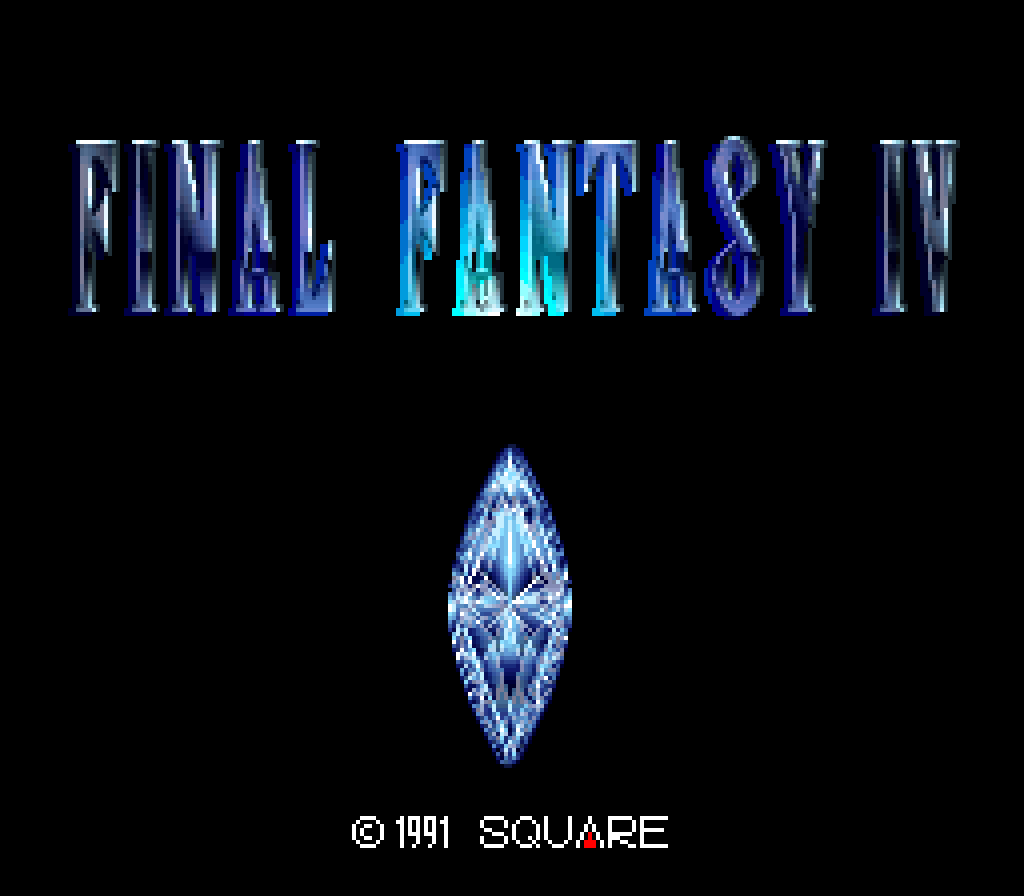
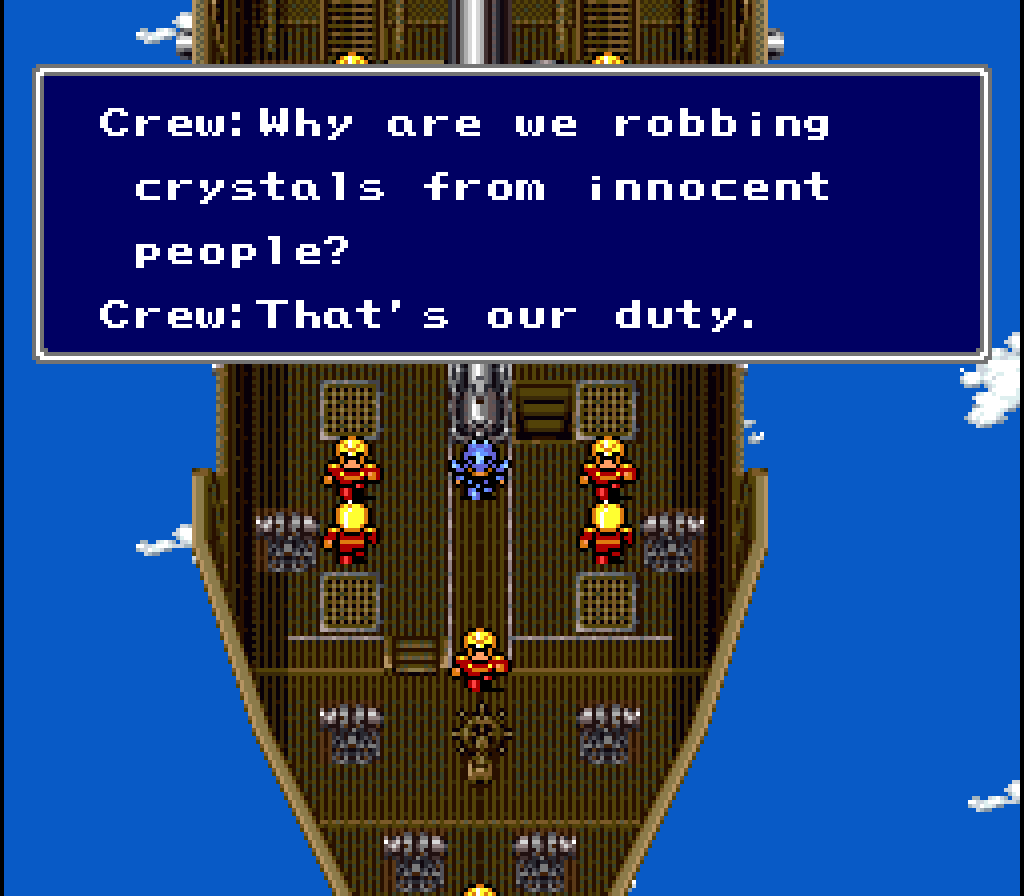
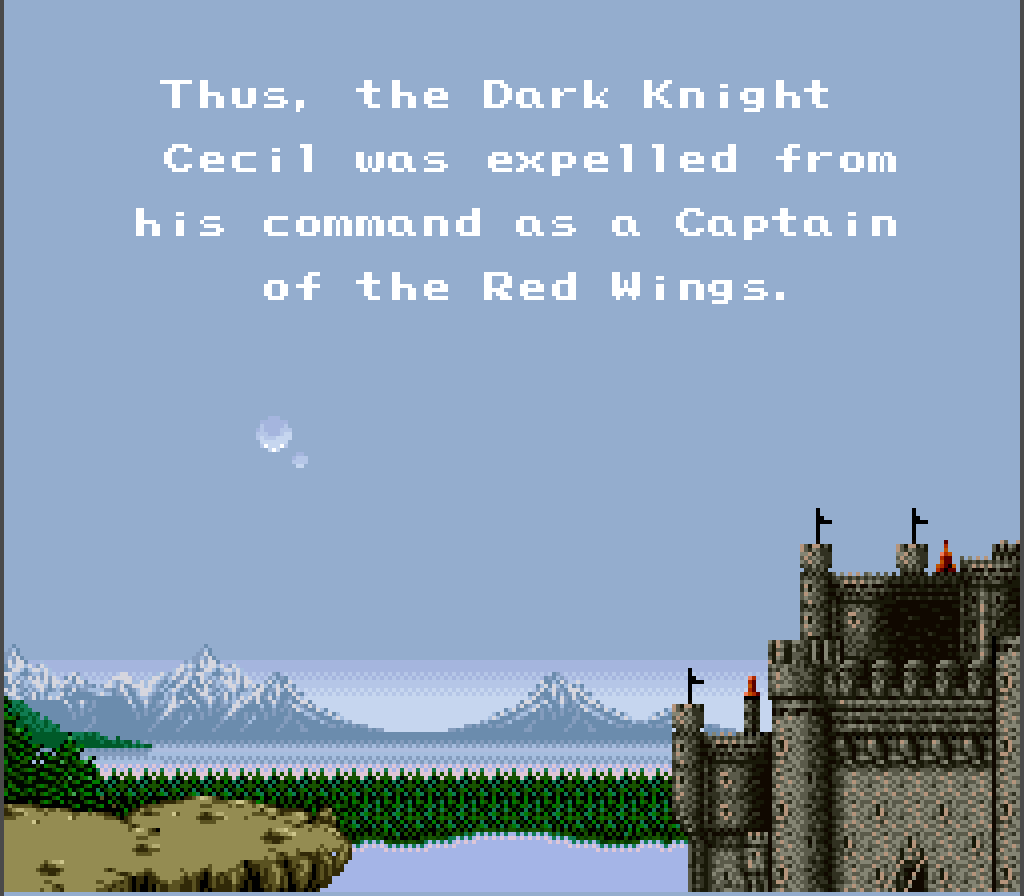
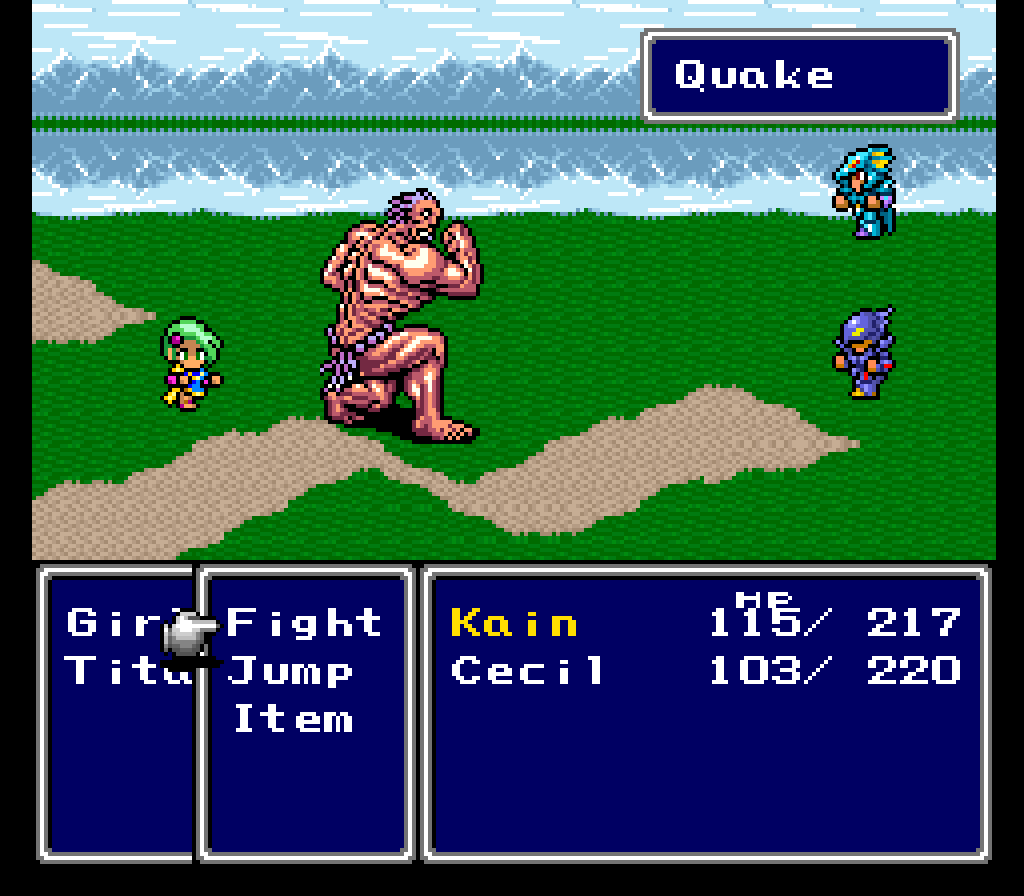
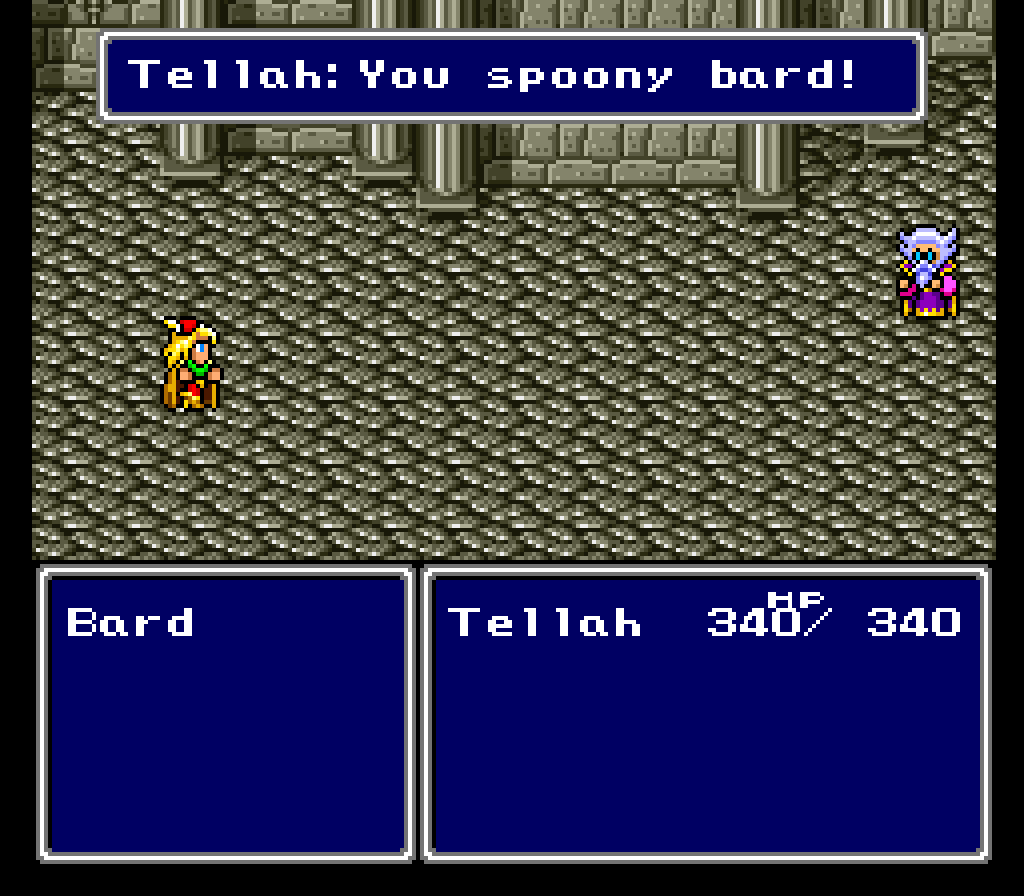
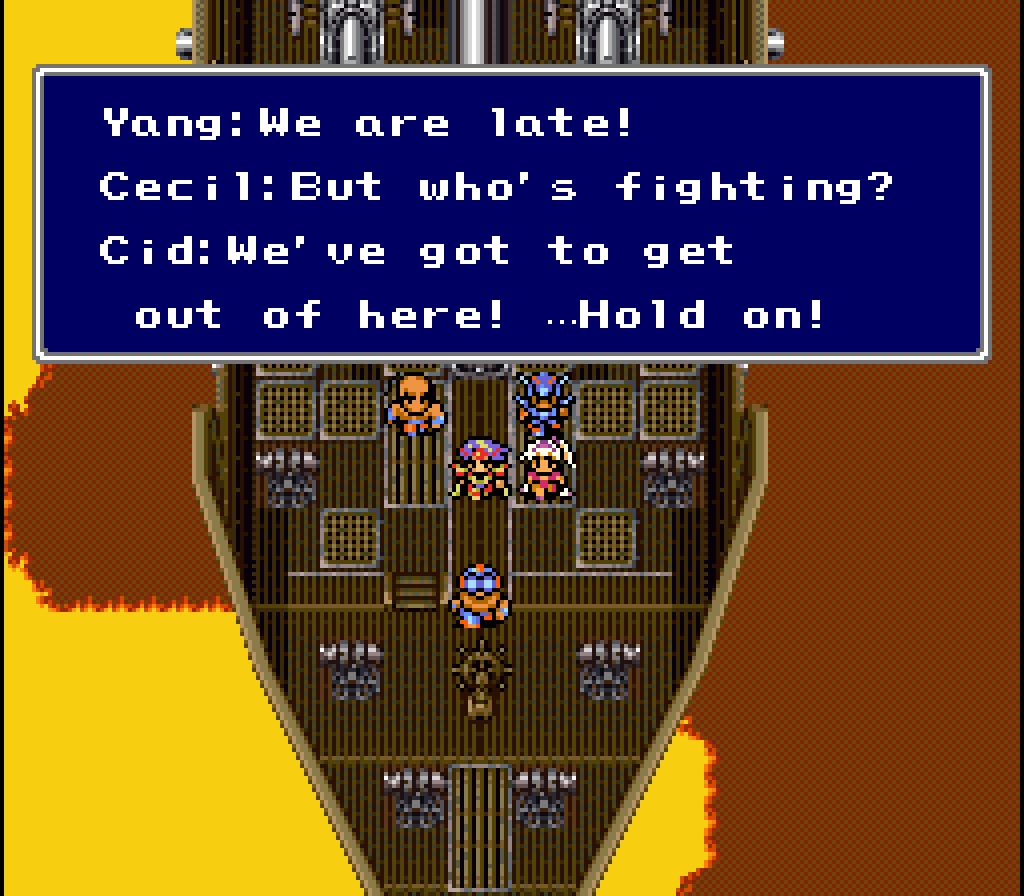
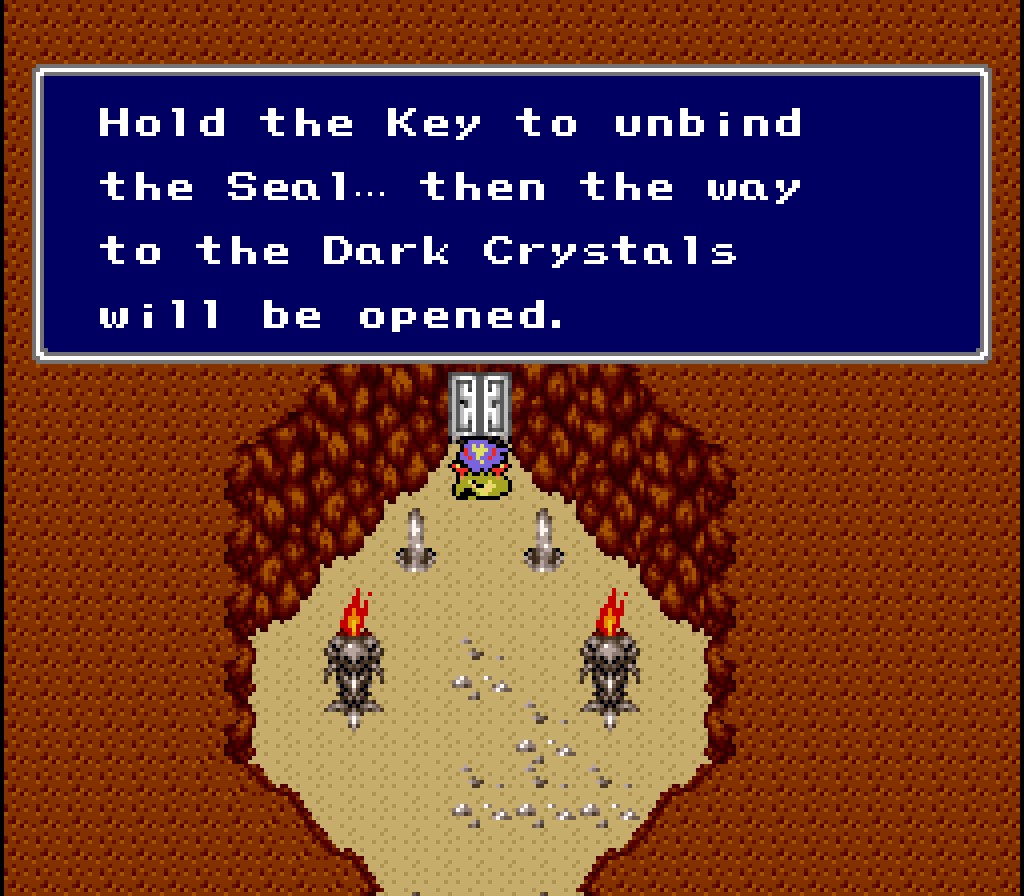
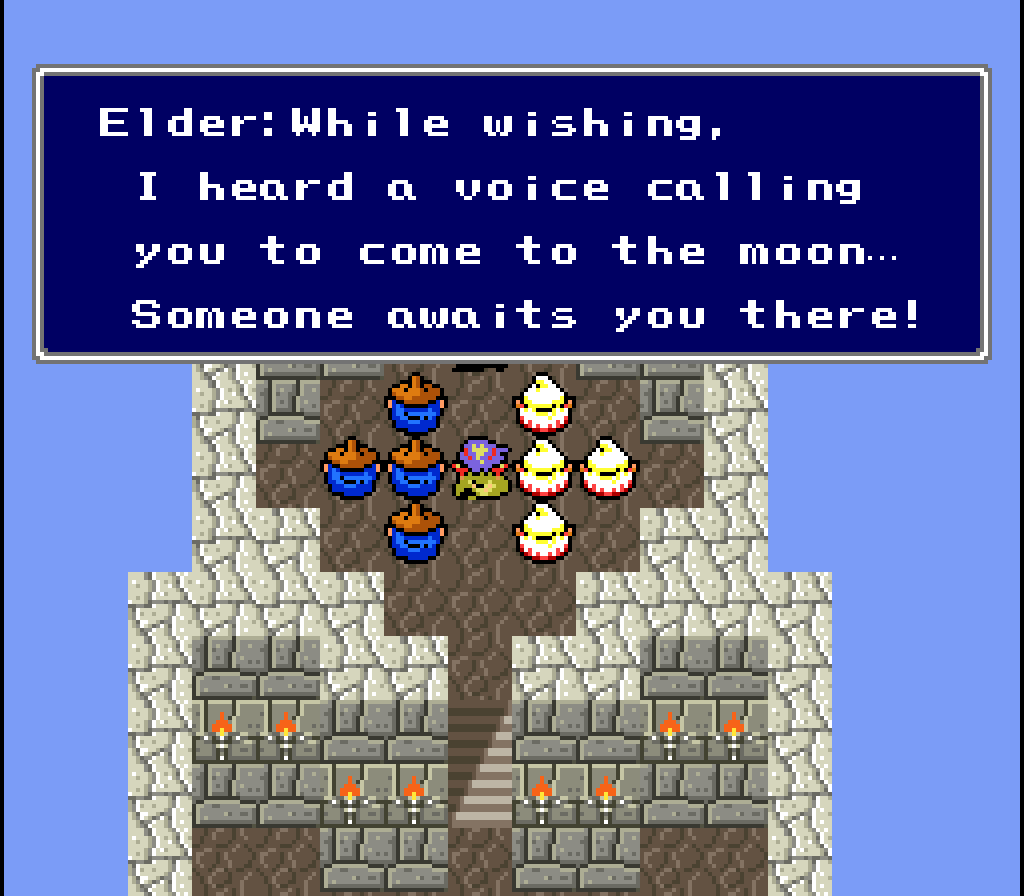
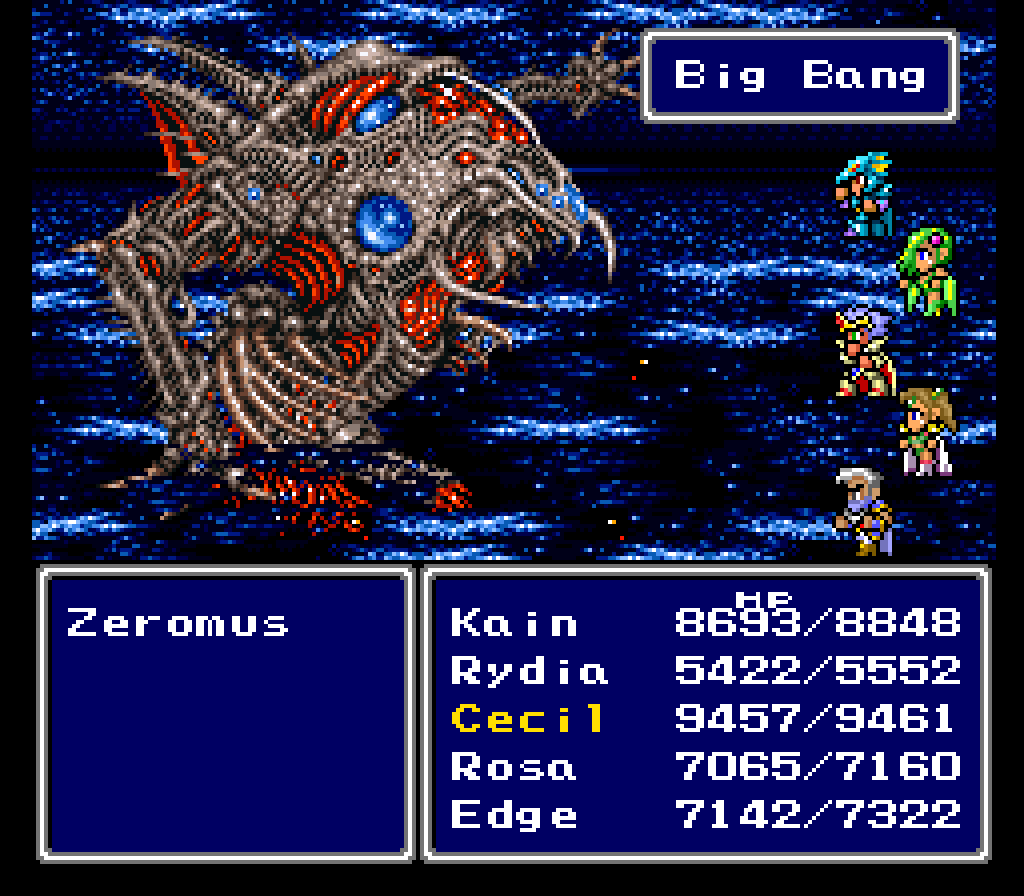
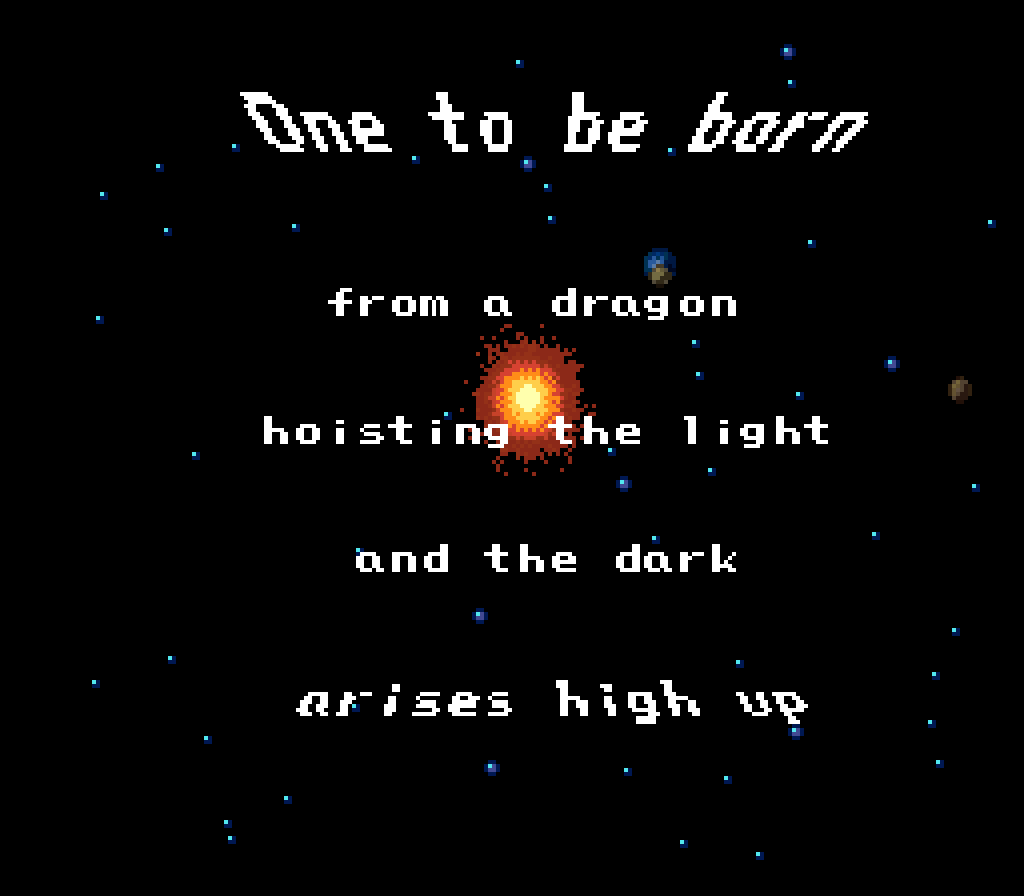
![press start to translate [Final Fantasy IV] press start to translate [Final Fantasy IV]](https://legendsoflocalization.com/wp-content/uploads/2019/08/bbenma.png)
As a kid, I actually always thought the “Take care, ho!” line was a pun, in the sense of the dwarves saying “Lali-Ho”, “Lali”, “Ho”, etc but it could mean “Take care, out there”, as that dwarf is guarding the exit.
Under “Battle of the Capes”, why didn’t you add this battle line that Golbez says in Japanese?: しばらく、おとなしくしていてもらおう!
He says this after his “はっはっはっ、これがお前たちの力か…。” in Japanese.